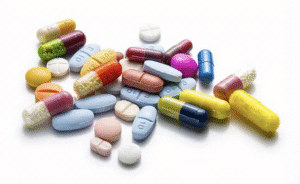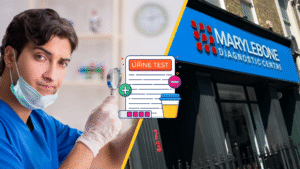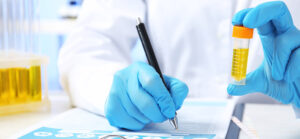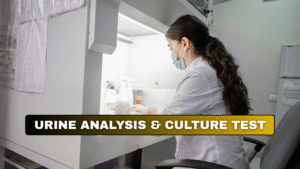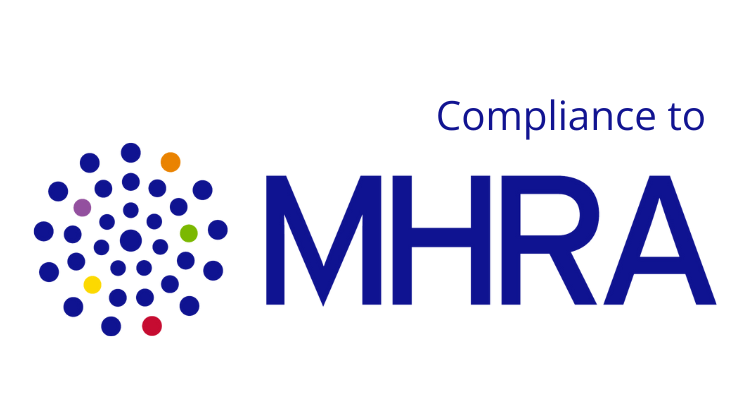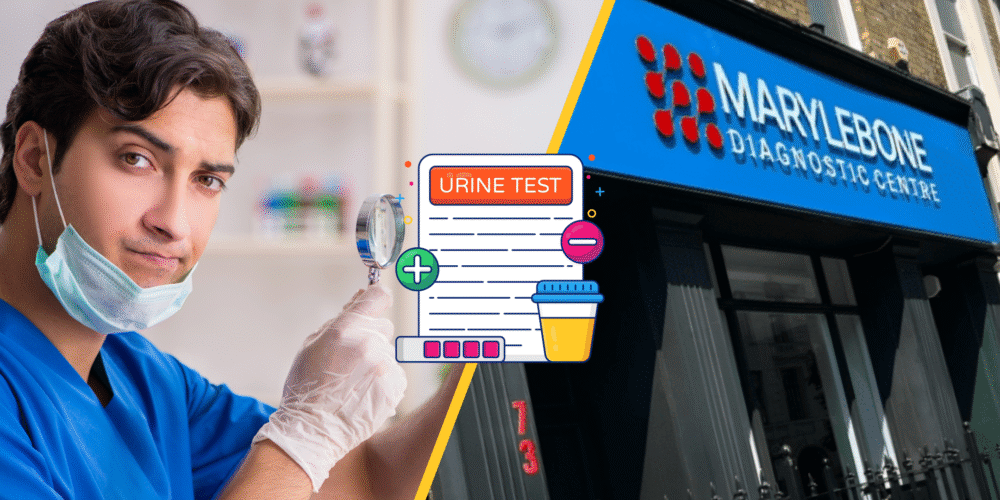
Urine Changes Explained – When to Get Tested in London
Reviewed by Dr Lauren Holland • Marylebone Diagnostic Centre, 73 Baker Street
Urine analysis, urine culture, kidney screening • Results in 24–42 hours
Westminster residents enjoy 20% off all urine and infection tests.
Changes in Urine: What They Mean for Your Health
Changes in urine can reveal important clues about your health.
Every day, many people in London search for questions such as:
- “White floaties in urine”
- “Leukocytes in urine – normal range”
- “Why is my urine bubbly?”
- “Urine protein/creatinine ratio meaning”
- “Do I have a urine infection?”
While many urine changes are harmless, some can indicate an infection or early kidney concerns.
Understanding the difference is important.
This guide explains what common urine changes may mean, when to take action, and which tests Marylebone Diagnostic Centre offers for fast, accurate answers.
What Can Cause Changes in Urine?
Urine appearance can change due to several factors, including:
- Dehydration
- Urinary tract infections (UTIs)
- Kidney or bladder conditions
- Diet or supplements
- Intense exercise
- Certain medications
Most causes are temporary.
However, persistent or unusual changes should be checked.
White Particles or “White Floaties” in Urine
White particles in urine may appear as:
- Thread-like strands
- Cloudy fibres
- Small white dots
- Mucus-like material
- Milky or clumpy residue
The appearance alone does not confirm a diagnosis.
Laboratory testing is the most reliable way to understand the cause.
Common Causes of White Particles in Urine
1. Normal discharge (more common in women)
Vaginal discharge can mix with urine during sample collection.
This is usually harmless and not a medical concern.
2. Urinary tract infection (UTI)
White particles may be caused by leukocytes (white blood cells) or bacteria.
This is one of the most common reasons patients seek testing.
Possible symptoms include:
- Burning or stinging when urinating
- Increased urgency
- Frequent urination
- Lower abdominal discomfort
- Cloudy or strong-smelling urine
If symptoms persist, testing is recommended.
Kidney or bladder inflammation
Rare but important to rule out with testing.
Recommended MDC tests:
- Urine Dipstick
- Urine Microscopy
- Urine Culture
- Kidney Profile (creatinine, eGFR, protein levels)
Leukocytes in Urine: What Is the Normal Range?
Leukocytes (white blood cells) are part of the immune system.
Their presence in urine usually means inflammation or infection.
Normal range:
- Ideally 0–5 WBC per high-power field (hpf).
Higher levels may indicate:
- UTI
- Kidney infection
- Bladder inflammation
- Contamination (common in women if not midstream collection)
If leukocytes are high, a urine culture can identify the exact bacteria and the best antibiotic.
Recommended MDC test:
Urine Culture + Sensitivity (gold standard for UTIs)
Results 24–42 hours.
Bubbly or Foamy Urine: Should You Worry?
Occasional bubbly urine is usually harmless and linked to:
- Fast urination
- Dehydration
- Soap residue in the toilet
But persistent bubbly, frothy or foamy urine may suggest protein in the urine, a sign of kidney stress.
Common causes include:
Dehydration
Concentrated urine appears more foamy.
High protein intake
Very common with gym-goers, bodybuilders or high-protein diets.
Kidney filtration problems
Protein leaks into urine when the kidney filters are irritated.
This is where the urine protein/creatinine ratio becomes essential.
Urine Protein/Creatinine Ratio (PCR): What It Means
This test is used to detect proteinuria, an early sign of kidney strain.
Normal PCR range:
- Less than 15 mg/mmol
PCR may be elevated due to:
- Kidney disease
- Diabetes
- High blood pressure
- Infections
- Heavy exercise
- Dehydration
PCR is more accurate than a dipstick because it measures the exact amount of protein relative to creatinine.
Recommended MDC test:
Urine Protein/Creatinine Ratio + Kidney Function Panel
Results in 24–42 hours.
Blood in Urine (Hematuria)
Hematuria can be:
- Visible (pink or red urine)
- Microscopic (detected only on testing)
Causes include:
- UTI
- Kidney stones
- Exercise-induced hematuria
- Menstruation (in women)
- Prostate inflammation (in men)
Important: Blood in urine should always be investigated, even without pain.
Recommended MDC tests:
- Urine Dipstick
- Urine Microscopy
- Urine Culture
- Kidney Function
- PSA (for men 45+) if appropriate
Signs You May Have a UTI
Common symptoms include:
- Burning sensation
- Urgency or frequent urination
- Cloudy or strong-smelling urine
- Lower back or pelvic discomfort
- Fever (in more severe cases)
UTIs are extremely common and can be diagnosed quickly with urine testing.
Gold standard at MDC:
Urine Culture (with sensitivity testing)
This identifies which antibiotic will work best.
When You Should Get a Urine Test
You should book a urine analysis if you notice:
- Cloudy or milky urine
- White particles
- Persistent foam
- Strong smell
- Painful urination
- Increased frequency
- Lower back pain
- Blood in urine
- UTI symptoms
- Swelling in legs or face (possible kidney issue)
- Fatigue with no clear cause
Early testing prevents complications – especially for kidney health.
What Urine Tests Does Marylebone Diagnostic Centre Offer?
Urine Dipstick Analysis
Quick screen for leukocytes, protein, blood, nitrates, glucose, ketones.
Urine Microscopy
Checks cells, crystals, bacteria and inflammation.
Urine Culture
Identifies bacteria and antibiotic sensitivity.
Urine Protein / Creatinine Ratio (PCR)
Accurate kidney function marker.
Kidney Function Blood Panel
Creatinine, eGFR, urea, electrolytes.
Full Infection & Inflammation Profile
If symptoms are unclear.
All results return in 24–42 hours, and all testing follows QC-validated laboratory standards.
Westminster residents receive 20% off.
Where to Get a Urine Test in Central London
Marylebone Diagnostic Centre
73 Baker Street, W1U 6RD
5-minute walk from Baker Street Tube
Monday–Saturday | 08:00–16:00
Call: +44 7495 970109
Private rooms • Same-day appointments • Clear explanations


